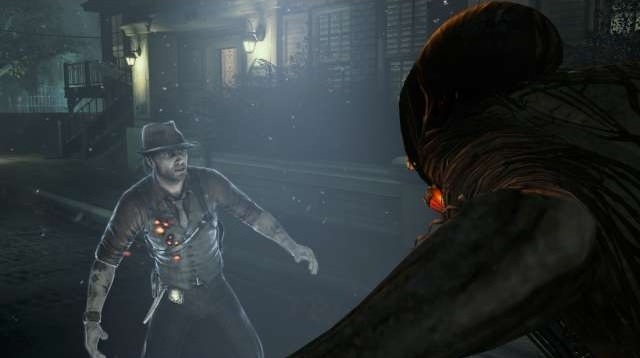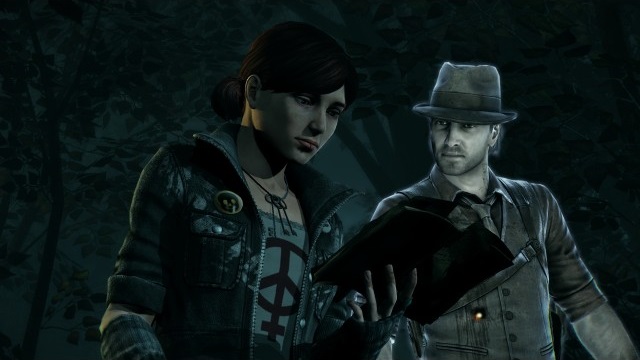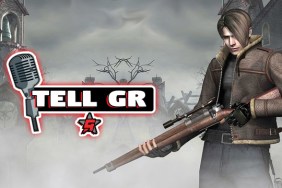Emotionally at its best… when you're alone in the dark.
Murdered: Soul Suspect was one of the surprise hits of E3 2013, as an adventure game developed for consoles with a novel concept, the ghost of a hard-boiled detective solving his own supernaturally themed murder in modern Salem Massachusetts. The hooded and mysterious game villain, the Bell Killer, throws ex-con-turned-cop Ronan O'Connor from a fourth-story window down, goes down to the street, and plugs his already half-dead body seven times with his own gun, finishing the job. Your first task, as the newly dead detective, is to investigate the crime scene of your own murder in the hopes that this will let you move on to join your murdered wife, Julia, in the afterlife.
It's all played very by-the-book with your tattooed hero playing everything close to his bullet-tattered vest, sarcastically commenting on everything with a wry quip. In flashbacks and collectibles that give us insight into his relationship with his wife, we see that Ronan's tattoos stand in for the emotions his deadpan delivery won't let him express directly. Ronan's emotional range runs from sardonic to annoyance that borders on, but never quite reaches, anger or alarm; he's got the jaded-detective thing down pat. The first part of the game has you shadowing the killer's target (you were just collateral damage that got in the way), a teen girl named Joy who's looking for her spirit-medium mother, with whom you eventually form a fragile alliance based on mutual need, though still couched in sarcasm.
Soul Suspect is incredibly smart in the way that it defines its limitations, using video game conventions as story elements. In other games, when objects intersect and merge, it's an accidental clipping error; here, Ronan is supposed to walk through cars, tables, and such as his ghostly form glows around the edges of whatever he's passing through, unable to effect the land of the living. The invisible walls that are an annoyance in other games are instead the limits of his incorporeal form's ability to move through the walls of consecrated buildings and the ghostly residue of forgotten ages past. Everything you can't do that would be an annoyance in other games is clearly and politely explained up front as the design.
So what can Ronan do? Put his detective skills to the test. The core gameplay of Soul Suspect is in its crime scenes and the detection of clues. Upon discovering the necessary clues, it's up to you to select which ones are important (they appear as pieces of broken glass) to figure out what happened at the scene, with three chances to get it right. The clues can be taken in by seeing them in the physical environment, possessing live people on the scene and "influencing" their memories with knowledge of the crime scene to force them to reveal what they know, peaking through their eyes at evidence, eavesdropping on their conversations, and using "poltergeist" abilities to interrupt people or the environment by messing with electronic devices.
These sections are frequently clever but have the same problem that many investigative adventure games do. As a player, it's easy to figure out where the clues lead, but assembling together which clues (and sometimes in which order) to force Ronan to reach that same conclusion isn't always clear or doesn't always make sense (or both). It can be frustrating to know what he's going to ultimately deduce from the clues but have to guess which clues force him to make that deduction. Figuring it out rewards the player with a psychometric reading of what happened, the events playing out in a flashback based on the objects involved.
In reality the bulk of the game is getting from one of these crime scenes to another, keeping an eye out for collectibles as you go, and the occasional stealth combat section taking down demons. There are side missions to help lost souls move on, investigating the circumstances of their deaths, but these are fewer and farther between as the game progresses. Each area of the game has its own set of collectibles (outside of generic ones that tell the story of Salem, like clippings about the killer and Ronan's relationship with his wife) which when completed, tells a specific ghost story about that location of Salem. Some of the best gameplay involves escort missions, where Ronan has to use his powers to distract living cops and other employees while Joy sneaks around them.
Demons are lost souls who have not moved on and have forgotten why they exist, continuing on only to devour the souls of the troubled ghosts left behind. Ronan can sneak up on them from behind (and later distract them by using crows) to execute them. This is made easier later in the game when his ghostly abilities extend to short-range teleportation, which also opens up formerly impassable places in some environments.
Soul Suspect is at its strongest when Ronan leaves Joy behind and ventures out into the dark and creepy recesses of the spirit world draped across the land of the living. It's at its best emotionally when it melds the familiar with the uncanny, when Ronan is moving through silent spaces the inhabitants have long since abandoned, and there is a sad sense of emptiness or despair. These moments, however, are few and far between and feel almost accidental.
Story-wise, Murdered: Soul Suspect is about as straight a detective story as you can get, following the conventions right down to Ronan continuing to smoke ghostly cigarettes well after death; at one point, flicking an incorporeal butt through the face of a still-living detective who never let him live down his criminal past. The game leads you straight to its red herring, while slowly leaving tidbits about the identity of the real killer all along, giving it a satisfying feeling of detective story completion. While the story is handled brusquely, it doesn't exactly take itself completely seriously, with inside jokes about other Square Enix-published games (one possessed woman thinks, "What's that game with the woman who raids tombs?" and half the cops seem to be playing Deus Ex: Human Revolution on their work computers).

Visually, Soul Suspect looked solid on Xbox 360 and PS3 in preview builds I saw this year, but the upscale is a little bland on the PS4, and the game's load-times felt a little long for a prior-gen game ported to Sony's high-powered console. Tomb Raider, after all, rebuilt Lara's face and hair from scratch; Ronan looks a little bit like he's been sculpted out of concrete. Other character models and dialogue are frequently repeated; while not a dealbreaker, it breaks the reality a bit when moving from possessing one cop to another to find they have the exact same thoughts in the exact same voice, expressing the same amazed tone at the serial killer's strength, "What a monster!"
It's mildly annoying that Ronan doesn't have a really quick way to get around for most of the game, until you can teleport he has to walk everywhere. Some ghostly residue hangs around that you can jump into to leap across larger environments, but this doesn't help much with exploration. Additionally, it's not exactly to Murdered: Soul Suspect's favor that when faced with a crisis that puts his compatriots in danger, Ronan's default speed is walking. I'll amble into danger just as slowly as this leisurely stroll will take me, dammit!
But so far I haven't answered the question of whether or not Murdered: Soul Suspect is any good. The answer: good-ish. It's not exactly amazing. It was shorter than expected, in a reasonable day and a half of play time, probably a good ten hours when scouring for collectibles. The characters are fleshed-out well by the behind-the-scenes collectible clues that show how Ronan and Julia's relationship develope, and how tentative she was about him beacuse of his past. However, it all feels a bit like filler that doesn't coalesce into something substantial.
The major problem that the story has, is its lack of a definitive conclusion in terms of Ronan's arc, since they've positioned the game as the first in a franchise with him in the lead. This would be fine if the game's core narrative were compelling on its own, but it doesn't give enough of a strong resolution to drive total interest; it's like the pilot episode for a TV show that's well-produced and that might be worth watching, but so far feels determinably middle-of-the-road in terms of plot and characters.
While the premise is clever and it hits all the right notes for a hardboiled detective noir, the execution is unsatisfying. Without a more definitive character resolution, it feels like an endless series of peppy but empty narratives without much in the way of character growth. In an adventure game, once the puzzles are over, the story is all you've got. Murdered: Soul Suspect, though it was diverting like a bit of light reading, never really hooked me. And that's its biggest problem.
-
Hardboiled dead-tective drama
-
Story never really comes together
-
Clever design limitations
-
Lack of character resolution
-
Necessary clues aren't always clear










